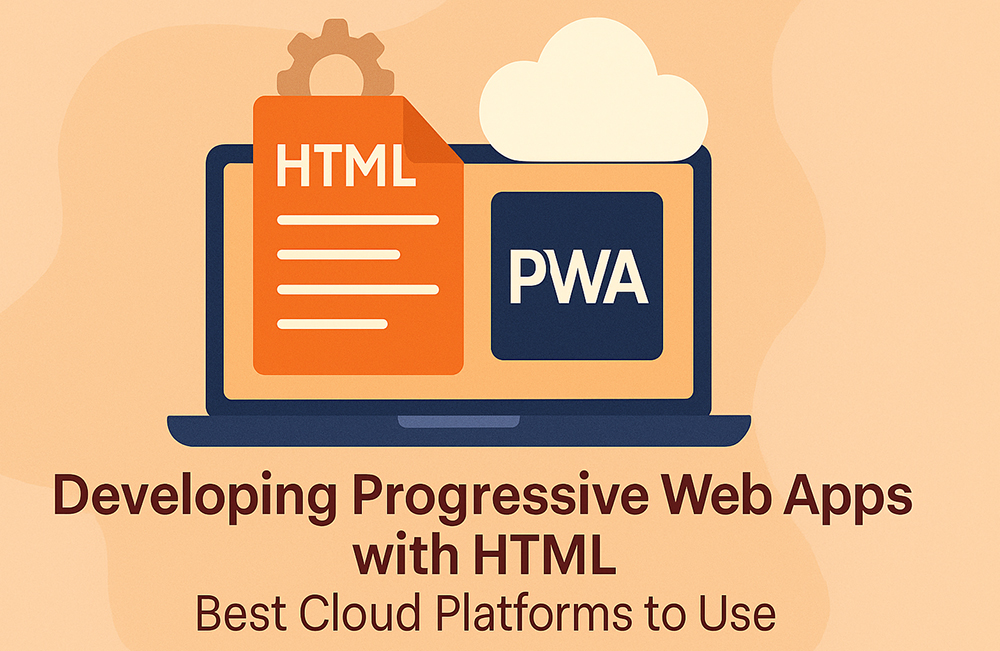Building Scalable PWAs on Cloud Platforms Using Only HTML
The advent of Progressive Web Apps (PWAs) is revolutionizing digital interaction by offering businesses a unified approach that harnesses the advantages of both mobile and web applications.. In 2025, the integration of PWAs with cloud platforms using HTML is becoming more essential for delivering high-performance, responsive, and accessible web experiences. This blog will explore the advantages of building PWAs on cloud platforms using HTML and why this combination is the future of web development.
In recent years, PWAs have emerged as a powerful alternative to native apps, offering the flexibility to work offline, send push notifications, and provide an app-like experience through web technologies. Businesses are increasingly adopting PWAs because they are cost-effective, easier to maintain, and can reach a broader audience without requiring downloads from app stores.
Cloud platforms offer a robust infrastructure for hosting PWAs, allowing developers to leverage scalability, reliability, and global content delivery. Using HTML as the core of PWA development ensures compatibility across devices and seamless integration with JavaScript and CSS for enhanced interactivity and styling.
Why Cloud Platforms Are Ideal for PWAs
The combination of cloud hosting and PWAs creates a resilient and adaptable ecosystem. Cloud platforms offer automatic scaling, which is crucial for handling varying user loads efficiently. With HTML as the backbone, PWAs benefit from fast load times and a uniform user experience across multiple devices. Furthermore, cloud-based Content Delivery Networks (CDNs) significantly reduce latency, ensuring that users experience minimal delays when accessing the app.
Another advantage of integrating PWAs with cloud platforms is the ability to implement serverless functions, reducing backend management while maintaining performance. This is particularly useful when building real-time applications, such as chat apps or live data dashboards.
Leveraging HTML for PWAs on Cloud Platforms
One of the key benefits of using HTML for building PWAs is its universal compatibility. Since HTML is a core component of the web, it seamlessly integrates with CSS, JavaScript, and other technologies required to build interactive and dynamic apps. When hosted on cloud platforms, these PWAs benefit from improved load times, cross-device compatibility, and the ability to function offline. This combination ensures that PWAs can be accessed reliably from various devices, including smartphones, tablets, and desktops.
Another critical factor is cost optimization. Leveraging HTML in PWA development allows businesses to reduce costs, as it eliminates the need to build separate versions for iOS and Android. The cloud infrastructure supports efficient resource management, allowing apps to scale based on user demand. This efficiency translates into significant savings, especially for small and medium-sized businesses looking to maintain a strong online presence.
Real-Life Implementations of PWAs on Cloud Platforms
Companies like Twitter, Pinterest, and Uber have already embraced PWAs hosted on cloud platforms, reporting improved performance and increased user engagement. These success stories demonstrate how combining PWAs with cloud hosting leads to resilient, scalable, and highly responsive applications.
The Future of Web Development with PWAs on Cloud
As we move further into 2025, the demand for PWAs hosted on cloud platforms will continue to rise. Businesses that leverage this approach will enjoy faster load times, robust offline capabilities, and a consistent user experience regardless of device or network conditions. By combining HTML with cloud infrastructure, developers can build scalable, secure, and efficient PWAs that meet modern web standards.
In addition to performance and scalability, cloud hosting ensures that PWAs can operate in diverse environments. For instance, eCommerce sites, news portals, and interactive web applications benefit from cloud-based hosting because it supports high availability and reduces downtime. Integrating PWAs with cloud services like AWS, Google Cloud, and Microsoft Azure ensures that your web app can automatically scale in response to traffic surges, maintaining a seamless user experience.
By embracing cloud hosting for PWAs, businesses are also future-proofing their web presence. As technology advances, having a cloud-based PWA means easier updates, less maintenance, and more robust data security. This is particularly important as cyber threats continue to evolve, making cloud security protocols essential for any progressive web app.
In conclusion, building Progressive Web Apps (PWAs) using HTML on cloud platforms is the way forward for businesses seeking to deliver dynamic, resilient, and user-friendly web applications. This combination offers the performance, flexibility, and scalability needed to thrive in the digital landscape of 2025 and beyond.
Elevate your cloud performance with actsupport
Discover seamless infrastructure management tailored to your business
Stay updated! Follow us on social media! Facebook, Twitter, LinkedIn
Check out our newest blog entry (How actsupport turns Expectations into Results)





